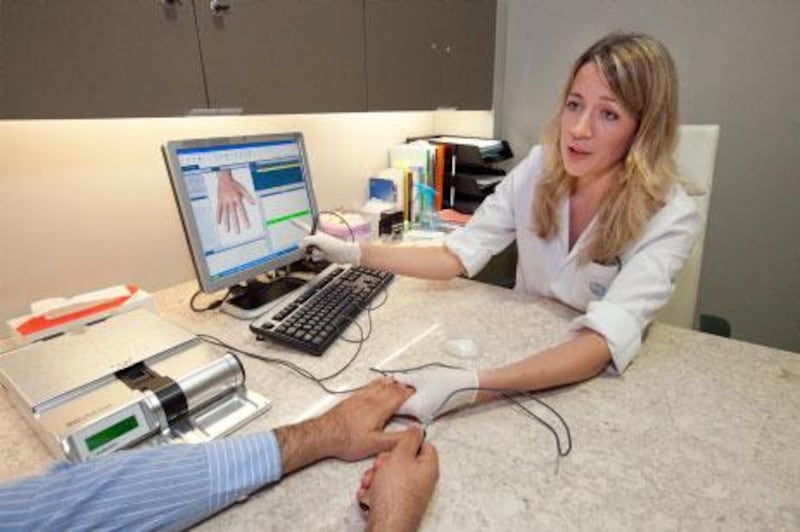I'm doing a lot more reading these days, namely in supermarkets. My new-found passion for label literature was triggered by a visit to a naturopathic doctor in Dubai, and specifically an encounter with a machine known as an electrodermal testing device.
Wellbeing: The National lives
Activities, advice, features, news and all things health
[ Health ]
With a plethora of medical tests for food allergies and intolerances available in the UAE, my mission was to investigate the least invasive method on the market. Picture the scene two weeks prior: it's early on a Friday morning and having gulped my usual yogurt drink, I waited for slices of toast to brown and meanwhile scrambled some eggs, to which I added a dash of milk. Not long after eating this breakfast fit for a lean queen, my tummy begins to signal all is not well. It's a gurgle and dull pain I've often had, hence I knew it wouldn't debilitate me for long. Surely everyone feels like this, right? Wrong. In fact, the magic machine was later to reveal that my body was reactive to eggs, wheat and all types of dairy.
I did not reveal my suspicions to Dr Heather Eade when I visited her offices. Having undergone eight years of training in her native Canada, she's a licensed primary care physician with a specialisation in complementary medicine including nutrition, homoeopathy, Chinese medicine, herbal medicine and some physical medicine-like chiropractic adjustments.
"I'm interested in optimal function," she says. "I'm dedicated to treating the person as a whole and not just the cause of their illness. I'm not saying what I do is better than what conventional doctors do, I'm just offering people different options."
Her approach to health and well-being has caught on fast; the waiting list for a standard two-hour appointment can stretch up to six weeks.
As Eade sprays a cotton wool pad with water in a Petri dish and prepares an electrode-tipped stylus, she stresses how this equipment is not too suitable for conclusive allergy testing; for that, she recommends blood and skin scratch tests. Instead, she uses it to assess food sensitivities by measuring the body's stress reactions via the electrical resistance of the epidermis.
"If you look online for references to electrodermal screening you'll find all kinds of naysayers," she says. "Good and bad. But I think the utility of any test, the reliability of it, depends on how it's used and how the results are interpreted.
"Skin conducts electricity all the time, though we don't feel it, and in humans that electrical resistance stays relatively constant. So it's a good measurement tool for that reason. It will change when your body engages a stress or 'fight or flight' response."
A list of 160 items to be tested appears on her computer screen, including everything from wheat and lactose to dust mites and dog hair. Before we get started, a baseline reading of my skin is taken by pressing the stylus against the tip of my middle finger. Any readings above or below this green line will be interpreted as reactive or non-reactive respectively: the machine also emits a noise that rises in tandem with the sensitivity reading. It took about 30 minutes for the machine to indicate I am sensitive to flour, feta, cream and corn.
Armed with this news, I managed to avoid these foods 80 per cent of the time. As a result, the pain and bloating subsided almost immediately and inevitably by avoiding pasta and risotto and upping my vegetable intake, my jeans fit a lot better than they used to.
As for weight loss, Eade says she often incorporates results into dietary plans and typically follows up four to six weeks later to retest reactive and borderline items.
"When you're engaging a stress response, even a minor one, you're allowing insulin to consistently be higher in your blood stream than it should be, which makes you a little insulin resistant and programmes your body to hold on to fat stores," she says. Eade's diagnostic tools and treatments extend to helping patients from children to the elderly. Her youngest patient was a one-month-old baby with "terrible" reflux, which she treated by altering his nursing mother's diet and nutrition.
"I just saw him recently, he's six months old now," she says, "and he recovered really quickly - within the first month, in fact."
- An appointment with Dr Heather Eade, at Dubai Mall Medical Centre, takes two hours and costs Dh1,150 including a Dh500 consultation and Dh650 for testing. The test was provided free of charge to The National for review purposes. Call 04 449 5111 or visit www.tdmmc.com
Follow us on Twitter and keep up to date with the latest in arts and lifestyle news at twitter.com/LifeNationalUAE






